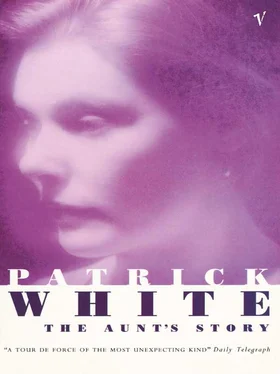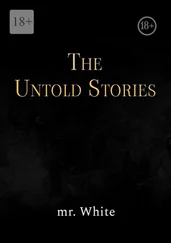‘What is that you have got, Theodora?’ Mrs Goodman asked.
‘It is a letter from Fanny.’
‘My girl doesn’t write to me any more,’ Mrs Goodman complained.
‘But it is the same thing. You may read it.’
‘I thought perhaps there might be something you did not want me to see.’
She took the letter that she would read once, twice, from her daughter Fanny Parrott, who spoke to her in words. Mrs Goodman read with pleased indifference of Fanny Parrott’s magnificence. Because her own day for this was done, she could not altogether believe that magnificence existed still. Though it would suit Fanny, when it would never have done for Theodora. Theodora, she said, is an old maid. And the sheet of paper tittered in her hand over Fanny’s nonsense about husbands. Men came to the house sometimes even now, and Theodora sat with them, but without the brilliance and deception they expect and need. Mrs Goodman listened to them take their hats and go, and she knew from their feet on the carpet they would go home undisturbed to bed.
But on the evenings when no one came, Mrs Goodman said, ‘Theodora, fetch the cards. Let us try a hand or two.’
Then Mrs Goodman would make marriages with Spanish pomp. She would tingle with hate and love in anticipation of the little kiss.
‘This fine lady,’ she muttered, ‘is waiting to be kissed. If he can get through. No, no, he won’t. He can’t!’
She held her cards in a firm fan.
Sometimes Theodora could feel the hatred in her mother’s hand. She could feel the pressure of the rings. Sometimes the mirrors swelled into the room, and the chandelier prepared its avalanche of glass. But mostly Theodora did not care.
‘Look, it is your game,’ she said.
‘It is no fun,’ said Mrs Goodman, ‘when one’s opponent does not try.’
Sometimes on these occasions she was like a one-eyed queen squinting for weaknesses.
‘I shall read till I feel sleepy,’ Mrs Goodman said.
But from the cover of her book her hand peered, diamond-eyed. She waited to snap the covers and say: You are caught, I saw you quail, I saw your soul gape open like a wound. It was the great tragedy of Mrs Goodman’s life that she had never done a murder. Her husband had escaped into the ground, and Theodora into silences. So that she still had to kill, and there were moments when she could have killed herself.
The day Theodora threw down her hat and said, ‘They say it is over, Mother. We shall have peace.’
‘Peace?’ Mrs Goodman murmured, studying its implications. ‘Then you won’t have to work in that canteen. You shall stay at home and rest.’
Her rings scraped on each other. She was the one-eyed queen, scanning a situation in which lay her last hope.
Theodora saw this, but more often than not it went on like a distant and rather wooden charade. She cultivated a vision of distance. The whole landscape became a distance, even when she walked close, under fire from scarlet salvia.
Summertime the whole air burned scarlet with salvia. She closed her eyes, let it become her smile, and in this airy disintegration there was some peace. To trail like the path of a hornet through the tasselled pepper trees. To mingle the glow of her scarlet parasol on the asphalt hill. Scarlet lit her face. It ran like blood beneath her brown skin. So that people stopped to look, sensing something strange, mopping their heads on the hot hill. But Theodora Goodman walked slowly through their glances, into the sound of the thin steeple, of the little spiky church, that stood protesting in the glow of summer.
In Theodora’s world a wet finger could have pressed the cardboard church, and pressed, until the smoking sky showed through. Sometimes an iron tram careered quite dangerously along the spine of a hill. People mopping their heads wondered uneasily into what they sank in Theodora Goodman’s eyes. People casually looking were sucked in by some disturbance that was dark and strange.
It was after the war some time, a year or two perhaps, that people began to talk about the tragedy of Jack Frost. Frost was a pastrycook. He kept a shop in George Street to which people went, the people who had names and good addresses, but Jack Frost himself lived in a street in Clovelly which was just a street. One Sunday Jack Frost cut the throats of his wife and three little girls. Just like that. Then, when he had locked his house, he walked to Central Station, where he was taken, asking for a ticket to a place of which he had forgotten the name.
The Jack Frost case caused quite a stir. People talked. They saw the shop. It was painted a dark green. And inside the window cakes stood on stiff stands, puffs blowing clouds of cream, and tarts high with black cherries, with paper doilies underneath. When the Jack Frost tragedy occurred, people were reminded of themselves in the shop, buying the murderer’s cakes, and passing the time of day. But it was horrible. Always so decent and polite, under it all Frost was mad, to kill his wife and three little girls. Unhinged by the war, of course. He had served, the papers said, in France. And Truth , which people began to buy, not from their newsagents, but over the garden fence, Truth had a full account, with photographs. It had a letter which Jack Frost wrote in his madness before he did the deed.
Dear All (wrote Jack Frost),
It come to this. I come home this evening, I seen your faces Winnie, Evelyn, Thelma, and Zoë, I see us all sitting round the table buttering our scones for Sunday tea. I saw as you didn’t know what was in the next room. Then I say to meself I will pin up them smiles so as we can all walk out, though maybe the Judge won’t agree.
Dear All, you will forgive me, yes I know, because it is already done, and now, my dears, we shall see.
Your ever loving dad and husband,
Jack Frost
It was terrible, they said, and indecent, to print madness for the public to read. People were moved far more deeply than they were by the bodies of lumpy girls, which appear so monotonously and anonymously on wasteland in the suburbs. The Frost case was worse, they said. They felt his cakes in their stomachs. They saw the dark hairs on his wrist as he handed back the change. The Frost case was very close, and for that reason they felt sick, and could not understand.
They were discussing it in the drawing-room, Mother, and Mrs Ewart, and a Miss Stevenson with a gold tooth, who had been brought for the first time. There was also Mr Clarkson, who had been recommended to Mrs Goodman by the Parrotts as solicitor.
Miss Stevenson with the gold tooth shuddered, and fingered the top of her glove. She always avoided murders, she said. There were so many nice things in the world.
‘But to think,’ said Mrs Ewart. ‘Those three little girls. They looked such nice little girls. The three. If only it had been one. Or even two.’
‘That, Connie,’ said Mrs Goodman, ‘is irrelevant detail. We were discussing the ethics of the case.’
Mr Clarkson said the whole incident had been distorted out of its true proportion, and the room listened, because he was a man. The Jack Frost murders had struck a chord of mass hysteria, which was always waiting to sound, and now particularly, since the war, since people had been left high and dry by other horrors. Now the individual was free to take the centre of the stage again and dramatize himself.
‘Don’t you agree, Miss Goodman?’ asked Mr Clarkson.
He was a bald man, with strong, clean hands.
‘Partly,’ said Theodora. ‘It is very personal. I find it difficult. Quite honestly. Difficult to discuss. I have thought about it. And it is still so close. Like something one has done oneself.’
Mrs Goodman cleared some phlegm from her throat in an exasperated, throaty spasm.
Читать дальше












